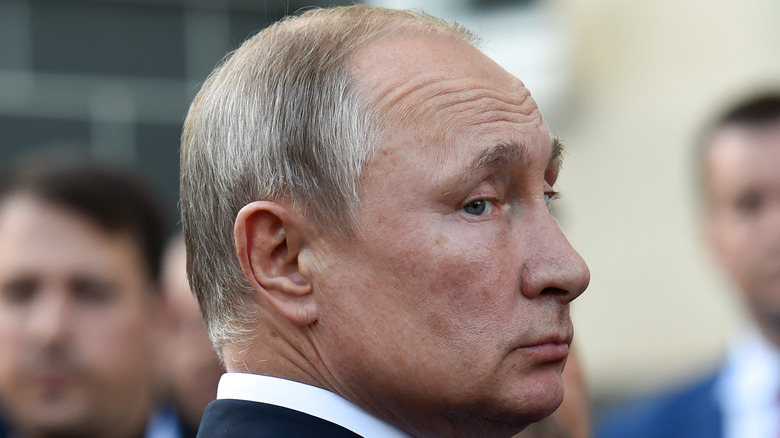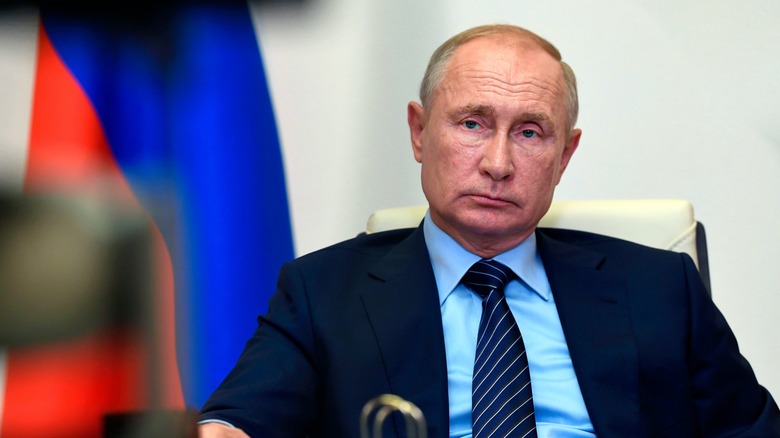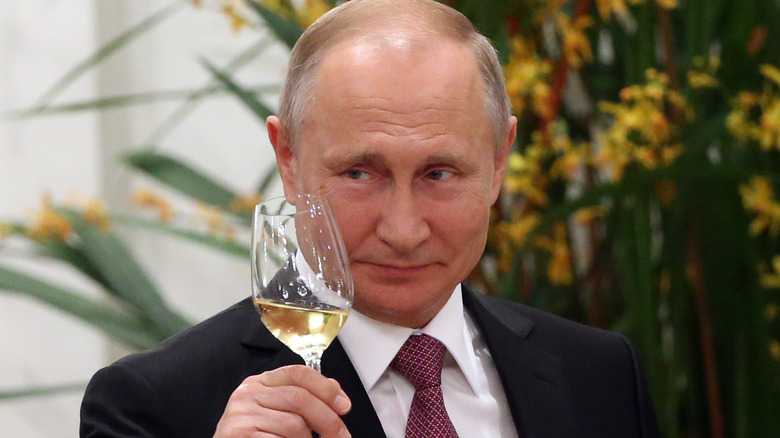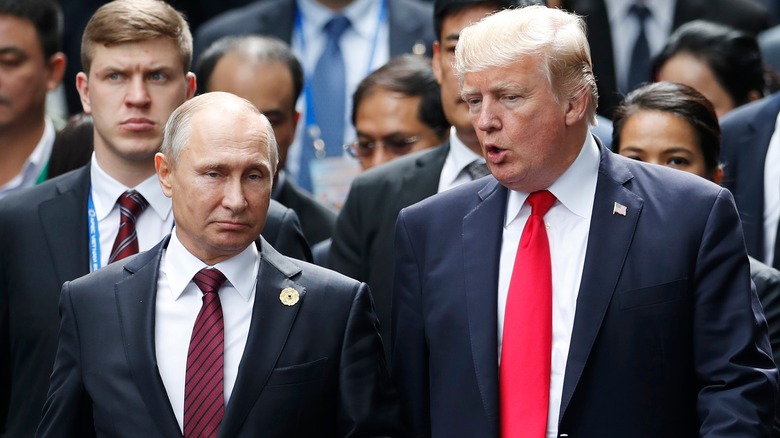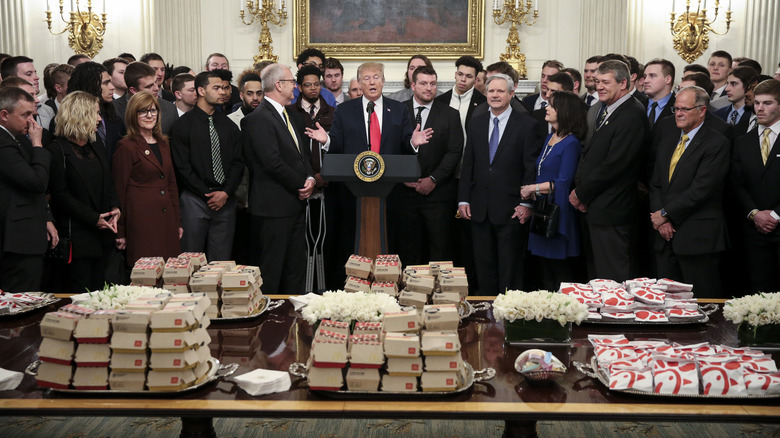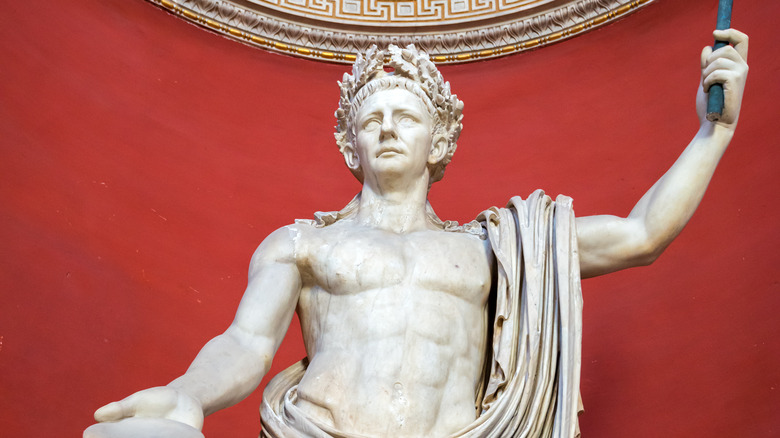Does Vladimir Putin Use Food Tasters To Avoid Poisoning?
If a world leader plans on invading another country, they probably figure someone somewhere might have it out for them. Any meal could be their last, which is why many politicians have historically employed tasters to test their food and drinks for poison. It's a strange job, but one that evidently is always hiring, according to Smithsonian Magazine. It just might not be an easy job to get.
With the world's eyes on Russian president Vladimir Putin — who invaded Ukraine in late February, to international condemnation — some dissident or foreign spy could be dreaming of his assassination. It's reasonable to wonder if the controversial leader has others trying his meals for him, but Putin's own dinner guests may have more to worry about. In 2006, Russian whistleblower Alexander Litvinenko sipped some tea during a meeting at the Millennium Hotel in London and became seriously ill. He died within the month, but not before accusing Putin of poisoning him with a radioactive drink (per The Washington Post). In a 2016 investigation, a retired British judge compiled evidence pointing to an assassination of Litvinenko "probably approved" by the Russian president. Not everyone dies after tea time, though; other political opponents of Putin's have been brazenly shot down in public.
Putin uses more than just food tasters
When Alexander Litvinenko was poisoned in 2006, it took nearly a month before he died. Obviously, state leaders like Putin aren't willing to wait weeks to see if they've been served radioactive tea. In 2014, Independent reported on a London meeting of the elite Club des Chefs des Chefs, where details leaked about the Russian president's "full-time food taster." While these "Chefs des Chefs" all shared the privilege of preparing food for leaders the world over, Putin's personal chef was not included among them — because his cook is part of his security detail. The logic for Putin's choice is the same for U.S. presidents (who also meticulously source food for diplomatic dinners): If guards are making the food, theoretically it must be safe to eat.
The Russian president besieging Ukraine has been known to ramp up security around his meals after political controversies break. In 2018 (per Mirror), Putin reportedly hired "even more" taste testers after accusations that he poisoned double agent Segei Skripal and his daughter in Britain. Skripal, a spy for the Russians who flipped to work for U.K. intelligence, was exposed to a deadly nerve agent in a Salisbury park (per Independent), leading detectives to suspect that the attack was a deliberate and targeted assassination attempt. Not only were Skripal and his daughter afflicted, but passersby were hit, too.
Putin keeps an eye on more than just his food
While Vladimir Putin has been known to keep tasters who thoroughly test his meals for poison (per The Independent), the Russian president is just as concerned with other forms of potential assassinations. The New York Post reported that Putin's bodyguards aren't just heavies with fancy guns, but a specialized squad selected for particular attributes like multilingual skills, stamina, and even not sweating in the heat. These "Musketeers," as they're called, are equipped with bulletproof briefcases and remote-detonation jammers, with the National Post adding "Kevlar umbrellas" to the mix. What's more, these guards are swapped out at age 35 to bring in new staff who can secure the life of the 69-year-old wartime leader.
Since the beginning of the pandemic, Putin has also been known to take social distancing to an extreme — keeping advisors at least 20 feet apart from him. He slipped on an entire hazmat suit and mask to visit a Russian hospital with COVID-19 afflicted patients.
What does a food taster do?
Vladimir Putin might be checking his food even more vigorously now, but food security is actually quite common among world leaders. However, the concept of the poor medieval peasant in the king's court, sipping wine and sampling meats to test for deadly poison, is largely outdated. Though Putin's culinary staff may not attend the Club des Chefs des Chefs, executive chefs for the president of the United States do a job similar to that of the Kremlin's cooks. White House chefs oversee the preparation of every bit of food that the president might eat, even if another cook is making it (via Mashed). Per The Independent, President George W. Bush, for instance, would fly out ingredients from home before dining with a foreign dignitary. His successor, President Barack Obama, had a food tester accompany him in France (via Smithsonian). And Michael Wolff writes in "Fire and Fury: Inside the Trump White House" that former president Donald Trump preferred fast food due to a "longtime fear of being poisoned" (via Insider). Given the long list of presidents who have faced assassination attempts, can you blame them?
So how does someone get a job as a food tester? Maybe check LinkedIn (though there's no guarantee that it's real, says Washingtonian). But any genuine applicant for the position of food taster would also have to fulfill other duties as assigned.
Food tasters alone aren't very effective
The more modern concept of having security-cleared culinary staff prepare food seemingly eliminates the need for a dedicated food taster — even if Vladimir Putin reportedly employs them on a regular basis. But Putin may prefer keeping a taster around for moral support rather than for any practical purpose. After all, even "traditional" methods of poisoning can take hours or days to kill someone.
Many common poisons simply don't kill fast enough to be detectable right before a meal. Smithsonian Magazine, in conversation with Cambridge chemistry professor John Emsley, found that taking high doses of strychnine and atropine can be deadly within a 24-hour period, with arsenic causing vomiting "within a few hours" and death possibly "within a day." But of all the most popular poisons, only cyanide, said the magazine, can kill someone before dinner's through. Cyanide poisoning is a pretty dramatic affair, with victims experiencing dizziness, dilated pupils, convulsions, and in some cases, seizures.
With only one kind of poison taking effect fast enough to notice before chowing down, Smithsonian writer Ashley Luthern suspected that royals and elected leaders like Putin likely consider food tasters "a placebo." Luthern explained, "The taster made the royal eater feel safer, but didn't really protect him or her."
The latest in a long line of paranoid leaders
If the Russian president and his American counterparts sound paranoid, they're not alone. According to The Independent, Japan's royal family had an official sushi taster until 1989, and Saddam Hussein was known to keep a fleet of tasters on the payroll. Adolf Hitler unsurprisingly was terrified that assassins were planning to spike his food near the end of World War II, and employed a personal food taster, Margot Woelk, to sample his meals each day. Elsewhere, Romanian dictator Nicolai Ceaucescu was also known to use food tasters to ease his paranoid of being taken out by his next meal.
Smithsonian Magazine wrote that the practice of tasting food to check meals for poison is as old as the ancient world. Historians know that a famous taster in ancient Rome was Halotus, who was the "official taster" for Emperor Claudius (above). While poisonings were rare, Halotus failed at least once in his job, as the emperor died on his watch. Apparently, getting a job as an imperial "praegustatores" could help a given Roman climb the social ladder, and somehow letting the emperor get killed didn't stop Halotus from getting a promotion later on.
